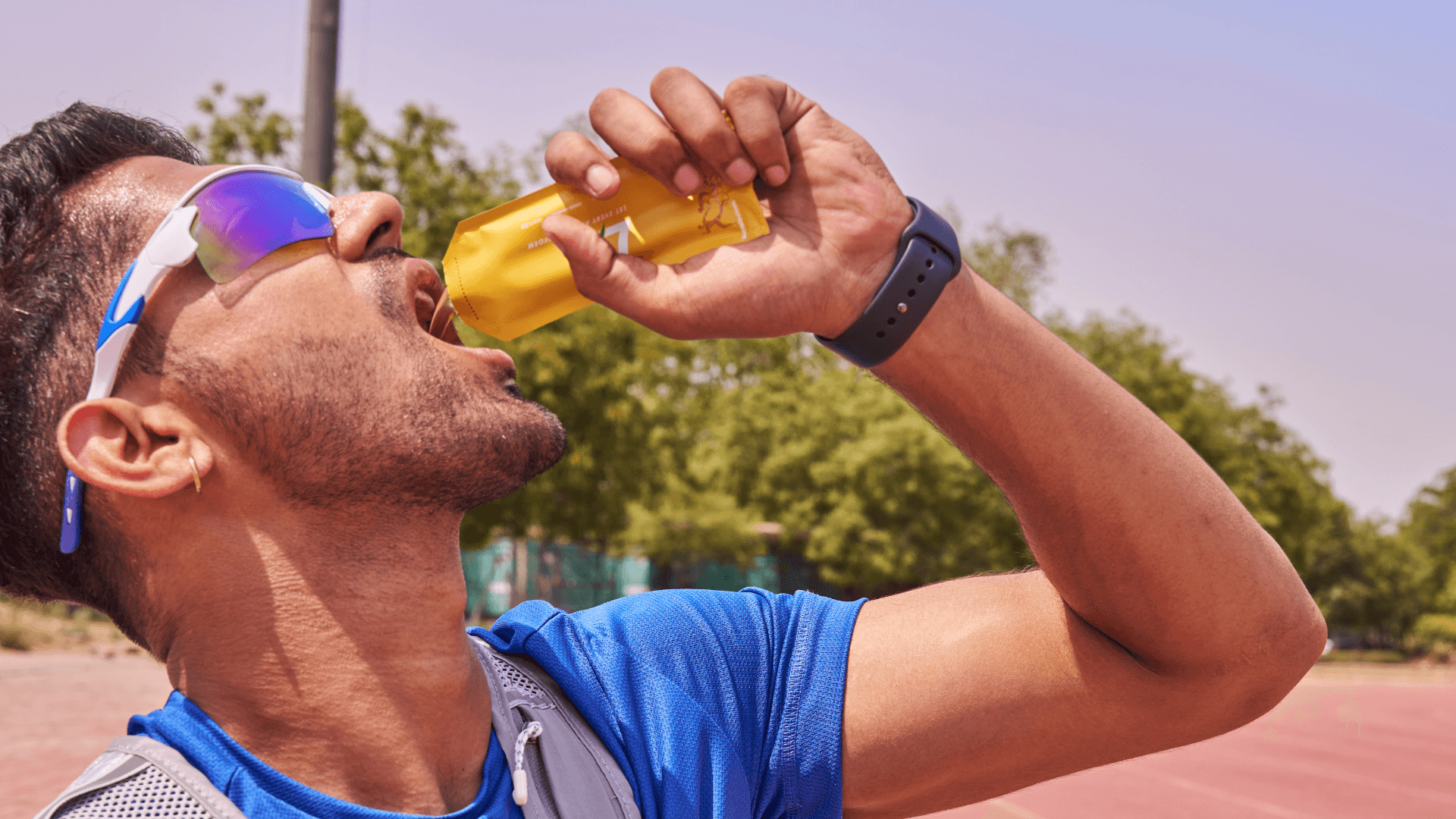Eat Your Way to the Finish Line: Marathon Training

Dr Linia Patel
Women’s Health Dietitian & Performance Nutritionist
- 21 September, 2018
- Running
- 6 min read
Eat Your Way to the Finish Line: Marathon Training
- Carbs: A regular intake of carbs as part of a balanced diet (specifically pre & post training) can help you to train harder, adapt and help to keep you free from illness and injury.
- Fat: Most of the time our primary source of energy comes from fat metabolism. But it’s slow to access and becomes of less use the harder we work and the faster we run. By eating enough carbs, we avoid having to use our fat stores. Training at a lower intensity than race pace (long slow runs) can increase the speed that we access fat stores, and spare our more limited carbohydrate stores for when we really need them!
- How Much?: We need some carbs as part of a healthy balanced diet but active runners need more. The amount of carbs you need depends on how active you are. To calculate the carbs you need, take your total body weight (kgs) and multiply it by carbs (grams). This will increase proportionately with the time you spend training.
- Offset The Sweat: Runners can lose a lot of fluid sweating especially during longer, high intensity training sessions. Monitor your hydration by aiming for regular urination – which should be pale in colour – by drinking frequently according to thirst. It takes 3g of water to store 1g of carbohydrate, so if you are eating additional carbs, you will be more thirsty.

Your training program is in full flow; the mileage is quickly ramping up and the new shoes are working their magic. But what are we forgetting?
You know what the next few weeks will look like training-wise, but what about food-wise?
Making sure you are fuelling your body correctly for the upcoming challenge – and necessary training – is just as important as the physical training.
Carb loading, energy gels, hydration, sports drinks, jelly babies; what is the best way to avoid burning yourself out before you even reach the start line?
Proper training is crucial to succeeding in a marathon, however, if you don’t fuel your body with the right nutrition that distance to the finish line will seem a far greater stretch. Understanding your individual needs and meeting them is key to optimal performance and reduction in injury risk.
Carbs to Go
Carbohydrates are an important source of fuel, especially during intense endurance exercise. If you are struggling to hold a conversation, then likely carbohydrates will be your predominant fuel source. Carbohydrate food sources such as bread, potato, pasta, and rice are digested and stored in your muscle and liver as glycogen, ready to use as energy, as and when you need it. The problem is, however, that we can only store approximately 2000 kilocalories of carbohydrates. Which sounds like a lot, but if you imagine a marathon requires on average 2500 calories to complete, the reality is it isn’t and you may ‘hit the wall’ sooner than you think.
To put it simply, a higher muscle glycogen level will allow you to train harder for longer and a low muscle glycogen will result in early fatigue and a lower training threshold. Consuming carbs before and after training allows you to fuel that training session, it allows your gut to practice using carbs efficiently during exercise as well as supporting your immune system and cognitive function. Stomach upsets are common in runners, but the gut is very trainable, so a practised fuelling strategy can lead to significantly less discomfort in time.
Take home message: A regular intake of carbs as part of a balanced diet (specifically pre & post training) can help you to train harder, adapt and help to keep you free from illness and injury.
Fat
During most daily activity our primary source of energy will come from fat metabolism. We have an almost abundant source of this on our bodies; even the leanest could survive, without food, on fat stores alone for weeks. The issue is that this source of energy is relatively slow to access, and therefore becomes of less and less use the harder we work and faster we run. By ensuring we are consuming adequate carbohydrates for training and races, we can ensure we don’t have to fall back on our fat stores, and potentially have to exercise at a lower intensity than desired. By training at a lower intensity than race pace (those long slow runs) we can also increase the speed at which we can access these fat stores, and spare our more limited carbohydrate stores for when we really need them!
But how much?
We all need some carbohydrates as part of a healthy balanced diet but active runners need more than inactive sedentary individuals. The amount of carbs you require very much depends on how active you are, specifically how many hours per week you spend training. Carb requirements are calculated on an individual basis using total body weight (in kgs) multiplied by carbs (in grams), which increases proportionately with time spent training.
Training duration/ situation |
Grams of carbs |
Time to consume |
| 3-5 hours per week/or athletes with large body mass or need to reduce energy intake to reduce body fat | 3-5g per kg of body weight | Each day
|
| 5-7 hours per week | 5-6g per kg of body weight | Each day
|
| 1-3 hours per day | 5-7g per kg of body weight | Each day
|
| 2-4 hours per day | 7-8g per kg of body weight | Each day
|
| 4 hours+ per day | 8-10g per kg of body weight | Each day
|
| Very intense exercise – 6-8 hours/day | 10-12+g per kg of body weight | Each day
|
| Before training/event | 1-4g per kg of body weight | Between 1-4 hours before training/event
|
| During training sessions/events lasting longer than 1 hour | 30-90g per hour | Start taking 45 minutes in
|
| After a training session or between multiple events | 1-1.5g per kg of body weight | Immediately after, aim for 6-10g/kg for the rest of the day
|
Take Home Message: To estimate your carbohydrate needs, you can use the information in the table to establish the number of hours you typically train each week and then calculate the suggested carbs in grams by your weight in kilograms.
Offset the Sweat
It is well known that exercise performance is impaired when dehydration occurs. We sweat during exercise to help regulate our core temperature; evaporation from the skin surface allows a cooling effect, aiding thermoregulation in the short term. Runners can lose a considerable amount of fluid as sweat, especially during longer, high intensity training sessions and/or exercising in warmer environments.
Day to Day
Dehydration is cumulative; therefore if you begin a training week dehydrated and subsequently fail to drink enough fluid, your performance during training sessions is likely to be reduced, hindering adaptation and any desirable gains.
Take home message: Runners can monitor and maintain hydration by aiming for regular urination, which should be pale in colour, by drinking frequently according to thirst, ideally with meals and snacks that naturally contain sodium to enhance rehydration. It takes 3g of water to store 1g of carbohydrates, so if you are consuming additional carbohydrates, you will likely be more thirsty.
Race Day
Sweat rates and therefore fluid losses can vary considerably between individuals. Thus it’s important you are aware of your fluid requirements during your training sessions and race. With this knowledge, you can then consider the practicalities of carrying and consuming sufficient fluid to maintain performance during the Marathon. The research indicates that a 2% drop in weight is on average the ‘tipping point’ at which performance is affected. Therefore, the aim of your hydration plan should be to drink more than the minimum volume of fluid to avoid a 2% loss in body mass. The method below can be used to calculate your loss.
The body is very sensitive to changes in hydration status, and it regulates this by encouraging consumption (thirst) and excretion (urination). Different climactic conditions (heat and humidity) and our specific acclimation to these conditions, will have a large effect on these responses. A warm race day, to which you are not accustomed (such as flying to a warm country during the winter for a race), will increase fluid requirements.
Hyponatremia (low sodium) is as significant a health risk as dehydration on race day. This is often caused by overconsumption of water, diluting the sodium level of the blood. Consuming sports drinks or oral rehydration solutions such as ORS (even cola has been shown to be effective) can help to offset this. By drinking when thirsty, and not seeking to over-hydrate before the race (this doesn’t work!), the risks are likewise significantly reduced.
Take home message: Following your thirst is a good way to reduce the effects of dehydration or hyponatremia, but bear in mind you may need to consume slightly more than normal on race day.
Sweat Rate Method & Calculation
Method
- Measure pre-run body weight; nude or wearing minimal clothing.
- Followed by a 30-60 minute run. Omit any food in this instance.
- Measure post-run body weight; nude or wearing minimal clothing.
Calculation
- Fluid losses = pre-run weight (kg) – post-run weight (kg) (+ fluid in litres)
- Calculate your losses over a given period of time, considering that;1kg is equal to 1 litre of fluid, e.g. if you lose 0.8kg over 30 minutes (with nil fluid intake) then you can assume you lose about 1.6 litres of fluid per hour at that speed/intensity, and in those particular temperate conditions. You can adjust either way if this changes.
- The aim is to avoid a 2% drop in weight

Advice
Over the last 20+ years our experts have helped more than 100,000 patients, but we don’t stop there. We also like to share our knowledge and insight to help people lead healthier lives, and here you will find our extensive library of advice on a variety of topics to help you do the same.
OUR ADVICE HUBS See all Advice Hubs

